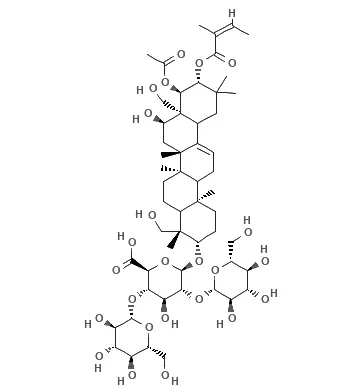| In vitro: |
| Animal Feed Science & Technology, 2005, 120(3-4):333-339. | | Effect of tea saponin on rumen fermentation in vitro.[Reference: WebLink] | The present study was conducted to investigate the effect of tea Saponins (TS) on ruminal fermentation in vitro using gas syringes as incubators.
METHODS AND RESULTS:
The TS were added at levels of 0, 2, 4, 6 and 8 mg against 200 mg mixture of corn meal and grass meal (1/1, w/w) in rumen fluid. In vitro gas production (GP) was recorded and methane concentration was determined at 3, 6, 9, 12 and 24 h incubation. After 24 h, the incubation was stopped and the inoculants were determined for pH, ammonia-N, volatile fatty acids (VFAs), protozoa counts and microbial protein yield. The GP was increased with the increasing level of TS except 8 mg at 24 h, which kept little change from that of the control. Methane concentration was decreased at all levels of TS at each incubation time. At 24 h incubation, inclusion with 2, 4, 6 and 8 mg of TS decreased methane concentration by 13, 22, 25 and 26%, respectively. The pH of ruminal fluid was slightly lower at 4 and 6 mg TS, but all values were in the normal range. Ammonia-N concentrations decreased significantly (P < 0.01) when the TS were included. Concentrations of individual and total VFAs were not significantly effected by TS addition. The TS significantly inhibited the protozoa growth in ruminal fluid (P < 0.01). At 24 h incubation, protozoa counts were reduced by 19, 25, 45 and 79%, respectively at levels of 2, 4, 6 and 8 mg of TS compared to that in control. The microbial protein was enhanced with the TS addition except 2 mg level, and reached 1.92, 2.36 and 2.61 mg/mL with addition of 4, 6 and 8 mg TS, compared to 1.50 mg/mL in control.
CONCLUSIONS:
It is suggested that TS could modify the rumen fermentation and inhibit the release of methane and ammonia, which may be beneficial for improving nutrient utilization and animal growth. |
|






 Cell. 2018 Jan 11;172(1-2):249-261.e12. doi: 10.1016/j.cell.2017.12.019.IF=36.216(2019)
Cell. 2018 Jan 11;172(1-2):249-261.e12. doi: 10.1016/j.cell.2017.12.019.IF=36.216(2019) Cell Metab. 2020 Mar 3;31(3):534-548.e5. doi: 10.1016/j.cmet.2020.01.002.IF=22.415(2019)
Cell Metab. 2020 Mar 3;31(3):534-548.e5. doi: 10.1016/j.cmet.2020.01.002.IF=22.415(2019) Mol Cell. 2017 Nov 16;68(4):673-685.e6. doi: 10.1016/j.molcel.2017.10.022.IF=14.548(2019)
Mol Cell. 2017 Nov 16;68(4):673-685.e6. doi: 10.1016/j.molcel.2017.10.022.IF=14.548(2019)